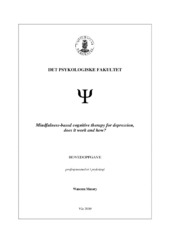Mindfulness-based cognitive therapy for depression, does it work and how?
Master thesis

View/
Date
2009-04-15Metadata
Show full item recordCollections
- Faculty of Psychology [527]
Abstract
Mindfulness-based cognitive therapy (MBCT) is a mindfulness based treatment modality for depression. It is based upon and has similarities to a Mindfulness-based stress reduction (MBSR) program developed by Kabat Zinn (1979). It has been, in recent, years investigated in relation to its potential to prevent and help depression symptoms. This thesis presents already published studies that have investigated the effectiveness of MBCT in the context of depression prevention. Inclusion criteria are specified and the main studies that are discussed in this paper are those who have some form for controlled group in their design. The studies are discussed in relation to methodological concerns. Current available evidence suggests that MBCT is indeed effective in reducing the risk of relapse, especially for individuals who have experienced at least 3 previous depressive episodes. Theory and research are also presented in order to illuminate the possible mechanisms that mindfulness-training might reduce relapse by.
Publisher
The University of BergenCopyright
Copyright the author. All rights reservedThe author